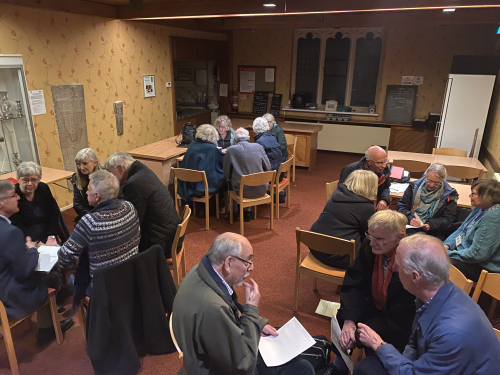What is a PCC and Why might I want to be involved? - 11/11/22

What is a PCC?
A parochial church council (PCC) is the executive committee of a Church of England and consists of clergy and churchwardens of the parish, together with representatives of the congregation. Every PCC is also a Charity and so it’s members are also trustees.
Legally the council is responsible for the financial affairs of the church parish and the maintenance of its assets, such as churches and church halls. It also assists the clergy in the management of church affairs in the parish, and promoting the mission of the church. The PCC also has a voice in the forms of service used by the church and may make representations on matters affecting the welfare and pastoral care of the parish.
The makeup of a PCC is set out in the Church Representation Rules. To be an elected representative of the congregation, a person must be a communicant, aged 16 or over, and must have been on the church electoral roll for at least 6 months unless under 18, they must be nominated and seconded by persons on the roll.
Lancaster Priory PCC meets 10 times a year. There is a list of current members in the porch of the church and the minutes of the meetings are publicly available (on request) after the have been approved by the PCC. The PCC delegates areas of work to the following subcommittees: World and Community Group, The Resources Group and The Property Committee. They also plan to launch a new Social and Fundraising Group and an Eco Group in the coming year. The membership of these groups is wider than PCC members and they meet with different frequency depending on their delegated tasks and projects.
Why might I want to get involved?
Whilst PCC meetings include lots of different things, one of the most exciting things that they do is to help discern and respond to God’s call for the church, parish and use of it’s resources. Lancaster Priory has four particular strengths through which the PCC can describe it’s ministry and outreach. We believe these form a core part of our identity, gifting and calling. They are:
A- Worship
B- Christian Education
C- Community, Compassion and Kindness
D- Innovation, Creativity and Commerce
Alongside these four broad areas, our PCC have been discerning what God might be calling us to prioritise in ministry for the next 5-10 years, they have identified four priorities. In the photograph above, you can see the PCC discussing at their October meeting, the next steps of the process on four key areas:
One: Inspiring new generations.
Although Lancaster Priory has an able and committed core of lay people, these are largely drawn from amongst the retired. Those of a working age are often more peripheral to the life of the church. University students can struggle to make links with the rest of the congregation. As the Priory emerges from the pandemic, it is clear that the work of evangelism and mission with children, young people and their families has suffered. There is a strong cohort of choir families who are committed to the priory but not necessarily well integrated into its life and ministry. We long for the Priory congregation to become broader and more diverse, better representative of our parish and city.
Two: Growing deeper roots on the Marsh.
The Marsh estate, which is amongst the more deprived areas of the city, comprises almost 1/3rd of our parish population along with the neighbouring new Luneside development and is largely unreached by the church. We believe we are called to invest in evangelism and mission in this part of our parish, to plant new congregations, as well as continuing the work of supporting families and young people and offering friendship to the elderly. We believe that we have been called to witness through word and service to proclaim the message of God’s unconditional love on the Marsh.
Three: A Resource for the City, Diocese and Region
The Priory has a recognised role within the city and region as a civic church. The annual pattern of civic engagements that come from universities, schools, city and county continue to be significant but we believe that we are called to develop a distinctive Christian voice within these relationships. The Priory is recognised as a significant and distinctive church within the diocese, but has not historically done much to resource other churches. We believe we are called to be a place of teaching and learning that empowers the people of God in a way that will benefit the whole diocese, and we seek to develop new ministries in this area.
Four: Caring better for God’s Creation
Lancaster Priory has been among the pioneers in Creation Care in Blackburn diocese, holding an ‘A Rocha’ Bronze EcoChurch award. We are fully committed to the General Synod 2030 net zero carbon target, use the Energy Footprinting Tool and Parish Buying Energy Audit. Recognising the crucial significance of the next five years in global efforts to prevent catastrophic climate change, we are committed to doing all we can at church and in our own lives to protect God’s creation, and acknowledge the generosity of God in his Creation.
The next PCC elections will be in May 2023 – could God be calling you to participate in mission and ministry as a PCC member in this next stage of mission and ministry?
Latest News
ANNOUNCEMENT: SUFFRAGAN BISHOP OF DONCASTER
Announcement It has been announced by 10 Downing Street this morning...
Read More...EPIC CYCLING PILGRIMAGE: JONATHAN MAYES, CEO OF CATHEDRALS TRUST, VISITS LANCASTER PRIORY
On Monday 19th May, the Cathedrals Trust CEO visited Lancaster...
Read More...The Lord's Prayer Tour with the Archbishop of York: Sunday 8th June at 4.30pm
As part of The Lord’s Prayer Tour across the...
Read More...

